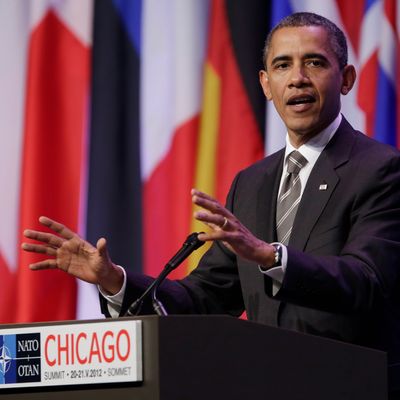
Cory Booker’s mournful plea to the Obama campaign — “Enough is enough. Stop attacking private equity, stop attacking Jeremiah Wright.” — is the kind of earnest, nonpartisan position that is helpful to any politician with larger national ambitions and positively essential to an African-American one like Booker, who has to do more to reassure the business community of his moderation. The equivalence is pretty silly. Romney is running on his record at Bain Capital, while Obama is not running on his record of attendance at the Trinity Unity Church of Christ.
On the other hand, there is a similarity between the two.
Almost any attack ad blends together literal claims with broader emotional resonances. The Willie Horton ad against Michael Dukakis employed an actual substantive issue (furlough policy in Massachusetts), which opened up a sewer of primal racial fears, the potency of which overwhelmed the scale of the issue at hand. Likewise, the proposed ad campaign featuring Wright used a legitimate question — how could Obama so easily tolerate a hateful demagogue? — in order to deploy racially charged innuendo.
Obama’s attack on Bain Capital has at least some of these features. Obama’s defense, when pressed by reporters, is perfectly sound. Romney has made his business career the center of his claim to expertise. Obama’s ads suggest reasons why voters should eye this experience warily:
The reason this is relevant to the campaign is because my opponent, Governor Romney, his main calling card for why he thinks he should be president is his business experience. He is not touting his experience in Massachusetts. He is saying he is a business guy, and this is his business …
When you are president as opposed to the head of a private equity firm, your job is not simply to maximize profits. Your job is to figure out how everybody in the country gets a fair shot.
That’s all true, as far as it goes. Indeed, that is the explicit case made by one of the workers featured in the first Obama Bain ad, who says of Romney, “He’s running for president, and if he’s going to run the country the way he ran our business, I wouldn’t want him there.” If Bain Capital is a model for how Romney would govern, it suggests he would focus on maximizing returns to capital at the expense of the interests of the broader public. That is a pretty fair synecdoche for Romney’s whole approach to domestic policy.
And yet the emotional message of the attacks on Bain goes beyond the literal claims it makes. The ads portray the mass layoffs that Romney’s work often created as a morally disqualifying act. Obama is not making “an attack on the free enterprise system,” as Romney says, but he is certainly encouraging an emotional sentiment that is hard to square with free enterprise. The liberal position is not really that workers should never lose their job, or even that productive workers should never lose their job. It’s that the wealth-creating possibilities of the free enterprise system ought to be ameliorated by measures to ensure broader opportunity.
Obama’s attempt to tarnish Bain as a credential for Romney is perfectly sensible. Booker’s recoiling at the emotional resonance of that campaign is sensible, too.






























